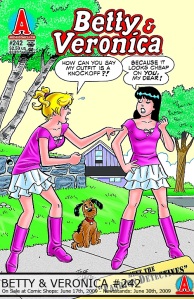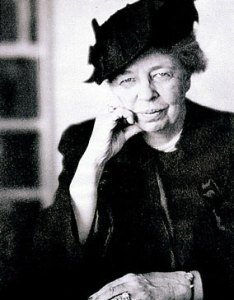Falling in love with your inner Betty/Leslie/Eleanor
November 29, 2009
Thursday night on NBC should really be renamed from “Must See TV” or “Comedy Night Done Right” to “Ladies’ Night.” The staple show for me is The Office at 9 p.m. EST. As I have mentioned in other posts, on this show, office lovers Jim and Pam have gotten married and own a house together with a private art studio for Pam in the rear yard – wouldn’t Edna Pontellier of The Awakening be jealous!, and “matronly” Phyllis is happily married rather than – as some might expect it – withering away as an “old maid,” her unattractiveness to the opposite sex limiting her romantic prospects. At 9:30 p.m., on 30 Rock, we get to witness the career exploits of successful female Television Writer-Producer and Third Wave Feminist Liz Lemon. But before all of that begins, we can spend 30 minutes with Leslie Knope (Amy Poehler), deputy director of the Parks and Recreation Department in Pawnee, Indiana. Parks and Recreation, a picaresque show, features the industrious Knope trying desperately to claim abandoned Lot 48 for a new park, which, as she envisions it, will be “a perfect park with state of the art swing sets, basketball courts and, off to the side, a lovely sitting area for kids with asthma to watch the other kids play.”
She really has thought of everything.
I love Leslie! She is completely earnest but not always politically savvy, much like myself. She challenges established authority, often makes a fool of herself when drinking too much and almost always says “the wrong” thing thinking it’s the right thing. Her office is full of portraits of her political heroes (Hillary Clinton and Madeleine Albright to name a couple) and she dreams of being the first woman President. (I let that dream go when I was 10 or 11.) Wouldn’t Knope’s election to Mayor, State Senate, Governor, Congress or even President be a fine ending to this empowering story?
When it comes to protecting her department’s claim to the former construction site turned abandoned pit, Leslie runs into certain obstacles: lack of funding, public disapproval and the “diabolical, ruthless bunch of bureaucrats” known as the Library Department. “They’re like a biker gang; but instead of shotguns and crystal meth(amphetamines), they use political savvy and shushing… The library is the worst group of people ever assembled,” she tells us, the viewers. “They’re conniving, rude, and extremely well-read, which makes them very dangerous.”
I had no idea that librarians could be that nefarious. (No wonder I’ve always stammered when asking for help with the Dewey Decimal System.) When led by Tammy, Leslie’s boss Ron’s ex-wife (Megan Mullally), that’s exactly what they become. Tammy is smart and pleasing to men. In other words, she’s Veronica to Leslie Knope’s Betty. And everybody knows that, in the world of classic comics, Veronica always gets her way.
 In Betty and Veronica, an Archie Comic circa 1950, two high school girls, best friends and simultaneously worst enemies, fight over one boy, namely Archie, and other things like clothes and popularity. And it always comes down to somebody winning out: on the material side, Veronica Lodge finds herself happy in her enviable position as a wealthy teen; but on the side of morality, Betty Cooper wins as the girl who will always do the right thing. In theory, every girl would like to be Veronica with pretty clothes and tangent high school boys fawning over her. But in reality, even if we want this kind of material wealth and attention, only some of us will have it. And the rest of us will have to settle, as “Bettys,” for whatever is left over. In the comic’s 600th issue, Archie proposed to Veronica. Poor, poor Betty.
In Betty and Veronica, an Archie Comic circa 1950, two high school girls, best friends and simultaneously worst enemies, fight over one boy, namely Archie, and other things like clothes and popularity. And it always comes down to somebody winning out: on the material side, Veronica Lodge finds herself happy in her enviable position as a wealthy teen; but on the side of morality, Betty Cooper wins as the girl who will always do the right thing. In theory, every girl would like to be Veronica with pretty clothes and tangent high school boys fawning over her. But in reality, even if we want this kind of material wealth and attention, only some of us will have it. And the rest of us will have to settle, as “Bettys,” for whatever is left over. In the comic’s 600th issue, Archie proposed to Veronica. Poor, poor Betty.
Of course, it’s all relative. There are many Veronicas I see that make me feel like a Betty. But I’m sure I’m probably Veronica to somebody.
It’s not that Veronica is all bad – or that Betty is all good, for that matter, it’s that Veronica is in possession of the things we validate as achievements in our culture, especially for women: money and good looks. Veronica therefore exhibits a sense of entitlement to all things within her grasp, where as Betty is prepared to fight for the things she wants in life. And of course, classifying women by “types” – such as how some men have done over the years thinking of us as either Madonnas or whores – is reductive. But this Betty/Veronica invocation is theoretical hyperbole used to examine our actions and how they affect the women in our lives.
Pawnee’s own Betty and Veronica, Leslie and Tammy, find this age old conundrum to be true: will Veronica or Betty get the thing they both covet? At first, Leslie thinks that she’ll be able to talk Tammy out of “stealing” Lot 48 to build a new branch of the library. She optimistically enters Tammy’s office, confesses her true passion for the park and finds that Tammy is strangely accommodating, agreeing to drop her crusade to rule the lot. “We government gals have got to watch each other’s backs, right?” Tammy remarks. And even though Leslie suspects that something about Tammy isn’t completely sincere, she shakes hands with Tammy. “Government Gals,” to our Betty, sounds like a wonderful and empowering organization. For shouldn’t women really want only the best for other women? (Yes, I have fallen for that trick too.)
Wanting to return the favor, Leslie tries to help her boss and his ex become friends again, which works and the two engage in an exaggerated and humorous series of sexual encounters. “I truly believe everyone should be friends with their exes,” Leslie tells us. “I can’t even tell you how many of my ex’s weddings I’ve been to.”
Leslie feels quite satisfied with her actions until she realizes that the sexual activities between Veronica and Archie – uh Tammy and Ron – are part of Tammy’s plot to seize control of the lot. “That woman really knows her way around a penis,” Ron confesses, adding that sex with Tammy is “like doing peyote and sneezing slowly for six hours.” Then he admits something quite controversial. Tammy and he have arranged a trade: sex for the land.
Leslie confronts Tammy:
I know what you’re doing. You don’t care about Ron. You’re just using him to get Lot 48 for your library.
Leslie, that’s crazy; and correct.
Why are you doing this?
Les, there are two kinds of women in this world. There are women who work hard and stress out about doing the right thing. And then there are women who are cool. You could either be a Cleopatra or you could be an Eleanor Roosevelt. I’d rather be Cleopatra.
Cut to: Leslie, direct-to-camera interview
What kinda lunatic would rather be Cleopatra over Eleanor Roosevelt!?
Cut to: Leslie and Tammy at the elevator
Haven’t you ever messed with a man’s head to see what you could get him to do for you? We do it all the time in the Library Department. You should come join us some time.
I would never work at the Library Department… We’re no longer Government Gals!
And that was the end of female political unity in Pawnee.
Well, not really; but this scenario does take us right back to the classic love triangle featuring two women and something they both love: giant pits of dirt. And it also stirs up a lot of moral murkiness. For instance, is trading sex for something acceptable in the political arena or anywhere else? There are theorists like me who would argue that trading sex for money as a service (prostitution) is morally acceptable and consistent with feminism provided that all ground rules are met: participants are safe and the money that is agreed to in advance is exchanged. However, I take issue with trading sex in this case because the sex represents an unfair advantage of one woman over another. Ron tells us that he likes pretty brunettes and breakfast food, and that Tammy made him breakfast while naked earlier that morning. He doesn’t want breakfast food (sex) from blond Leslie. Therefore, Leslie does not have the means to compete with Tammy.
Furthermore, in a professional environment where sex is restricted from being a commodity, Leslie and other women shouldn’t have to compete on a sexual turf for Lot 48 or any other resource. They should be able to make their best arguments for the use of the land and let an impartial leader, who isn’t sleeping with either of them, make an impartial decision. (I know: when does that ever really happen? Like Leslie, I’m optimistic that fairness is possible.)
The other issue I take with this type of sexual maneuvering is that it’s really bad for our feminist cause. It isn’t that Tammy is physically or emotionally hurt in the process – though Ron sustains some emotional scars, it’s that Tammy will damage her reputation and the potential for herself and other women to advance in their careers. Ever heard a man or woman around the workplace refer to another woman as requiring knee pads to do her job? This kind of cynicism makes it very difficult for women to get ahead because of their intellectual merit. In other words, the Veronicas of the world owe us Bettys some fair dealing when it comes to peddling sexuality lest we all will be undermined in our careers. Just because Tammy sleeps her way to the top, doesn’t mean the rest of us do. And just because a woman sleeps with her boss doesn’t mean she isn’t good at her job.
These are real paradoxes that exist for some women. I am really anxious to find out what will happen in the careers of David Letterman’s co-workers and simultaneous sexual “partners.” While our culture hasn’t been very hard on Letterman, human resource departments will struggle over whether Letterman’s ladies are Veronicas or Bettys: women who took advantage of male sexual desire to get ahead in business or women who were taken advantage of. Their ethics will be questioned even if his aren’t. Were they actually good at their jobs or just good in the sack? And what about why they did it: did they think they had to sleep with the boss lest they be excused from employment at The Late Show? It’s really muddy water over there at CBS…and everywhere in puritanical America where sex is concerned, I’m afraid.
This episode would probably have ceased to be funny if Leslie had done what I would have done: file a report with human resources the minute Ron told me he was participating in a sex trade. I’ll cut her some slack in the name of sitcom frivolity. (Shame on Ron, however!) But I do want to mention the opposing argument that I met with many times in graduate English seminars when talking about women in Victorian literature. Let’s take The Wings of the Dove, for instance, wherein a woman schemes to marry a poor man by asking him to seduce a dying woman so that, once she dies, all of her money will go to him and he’ll be free to marry the schemer. I remember a classmate explaining to me that I couldn’t be mad at the schemer because she’s a woman and she has to operate within the boundaries of the period and culture she lives in. The only way she can marry the man she loves is if they have some money, and the way she’s found she can get that money is to con an innocent out of her fortune.
That’s tragic. I’ve never been able to agree with this viewpoint, however, because I think a woman hurting another woman is counterproductive. This is why we have an expression “kicking someone when they’re down.” Women historically have been the underdog, so why would we kick each other? That same sympathetic logic applied to the Pawnee triangle would mean that Tammy’s actions are acceptable, even though Leslie gets hurt, because the limitations of Tammy’s circumstances make it difficult for her to get the lot any other way than by sexual means. Leslie was first to claim Lot 48 and she’s been working on her park idea for months. She is an obstacle for Tammy that can be overcome through sex. So, for me, the sex is just the means to a horrible end: Leslie loses her park. Is the sex wrong? Yes, because Leslie gets hurt and not because it’s sex. Bribery with any commodity like money or a promotion or food, etc. would also be wrong…because Leslie gets hurt.
Which is the prevailing feminism? It probably isn’t mine. In my experience, many feminists aren’t critical of women in these types of hypothetical scenarios. The tendency is to blame the man: it’s Ron’s fault, he’s in charge and he’s letting what he wants get in the way of doing his job, he’s using Tammy for sex and nothing more, etc. But in my book, I think that, while Ron is contemptible, so is Tammy. Tammy also should know better. Tammy should be kinder to a female comrade, a fellow “Government Gal.” Tammy should play fair and pose her argument for the lot to higher powers based on practical concerns for the community. (Where will the children with asthma sit in her library, for instance?)
And I agree with Leslie: only a “lunatic” would rather be a conniving, manipulative person over a bona fide hero.
Eleanor Roosevelt was the First Lady of the United States from 1933 to 1945, married to President Franklin D. Roosevelt. Her legacy includes such democratic feats as: co-founding Freedom House to evaluate the level of human rights consideration in government, supporting the creation of the United Nations and even serving as a delegate, as well as proving instrumental in launching the “Second Wave” of the Feminist Movement.
Perhaps she too was a Betty. Nothing like a conventional beauty, she often sacrificed personal satisfaction, adoration and comfort for a life of public service. And she had her own Veronica: Lucy Mercer Rutherford, her former social secretary. Informed and angry about the affair between her husband and her former employee, Eleanor reportedly threatened him with divorce, also known as political murder/suicide. She arrived at his deathbed to find Lucy by his side, which is really a tragic end to an unsatisfying romance.
However, Roosevelt’s unhappiness in love did not infect her political, feminist and humanist triumphs. Betty she may have been, but she was no less than the Betty I want to be.
Bea Arthur bows out

Bea Arthur...very tall, very funny
Maude Findlay was 47 years old and pregnant. What to do? Bring an unwanted baby into the home of two “over the hill” misfits in an unstable marriage? Disrupt her life – not to mention risk it – for almost a year and then give the baby away to mythically perfect adoptive parents? Abort the pregnancy?
This must have been a tough decision for Maude. But it was really a choice for Bea Arthur who, in playing Maude on Maude in 1972 – before the monumental Roe v. Wade decision of 1973, two months later – became the first actress to portray a lead character undergoing an abortion in television history.
However did Arthur reconcile her decision to play the liberal-minded, outspoken housewife who befriends homosexuals, supports the civil rights movement and advocates legal abortion? And Maude was the f-word too: f- f- f- feminist! Was that even allowed in 1972? Ms. Magazine was less than a year old and the National Organization for Women (NOW) was founded a mere five years before that. And then came Maude: mouthing off to her husband, harnassing her own reproductive rights, and taking a part-time job despite her hubby’s antiquated protests.
Last week, I read that Arthur (5/13/1922 – 4/25/2009) had died. I cried. I feel a tremendous amount of gratitude for all women who – however subtly – have chiseled away at the myths, the stereotypes and the expectations that make it difficult for other-than-standard beauties to thrive in this superficial world of ours. Standing 5 feet, 9 inches tall on bare feet and bellowing sarcasm with a distinctively low, husky voice, Arthur broke the mold. How? Perhaps, by simply not being afraid of it: “I can’t stay home waiting for something different,” she said once. “I think it’s a total waste of energy worrying about typecasting.”
After a semi-successful career in theatre, the actress broke into television with a memorable performance on All in the Family, from which Maude spun off. It was a picaresque show, really, because every good thing Maude wanted to do with the best of intentions always went wrong. But she was likable enough for most with her big heart and contrarily acerbic wit.
And later, in 1985, there came The Golden Girls: a show about four middle-aged to senior women living it up together in sunny Miami, Florida. As Dorothy Zbornak, Arthur wasn’t nearly as socially clumsy as Maude had been; but Zbornak was the butt of everybody’s jokes about being unattractive and sexless over the age of 50. The show won the Emmy for “Best Comedy Series” twice, in 1986 and 1987, and garnered each of the four women Emmy’s for their individual performances.
Arthur became famous for her deadpan sarcasm with lines like: You’ll have to excuse my mother. She suffered a slight stroke a few years ago which rendered her totally annoying…and…Well, I guess after a hard night of pillaging and raping, a Viking would want a little something to go with his cocoa.
I loved The Golden Girls. It gave me something to look forward to – namely fun and friendship…and cheesecake – in those years after my youth has faded and – as Hollywood has always envisioned it for me – my life is over. Here were four women who looked after themselves and each other. Men were accessories, often present for the sake of “war between the sexes” comic spectacle. Men were always disposable; until, as television luck would have it, Dorothy married Blanche’s (Rue McClanahan) uncle Lucas, played by Leslie Nielsen. The show fell apart when Dorothy left and was canceled the following season.
Dorothy was difficult to love for some, as Maude had been before her. I found her sarcasm funny, but when I wrote to my mother about Arthur’s death she couldn’t commiserate: “I found it difficult to watch her,” my mother wrote. “Not because of the issues but because she was so loud (coarse, rude) about them. It is possible that loud is necessary to get attention for these issues about which I was already on board. Too close for comfort, maybe.”
What’s of particular interest to me is that, perhaps like many, I had always assumed that the coarseness of Arthur’s characters – the stuff of my mother’s discomfort – went part and parcel with her “real” self. But apparently, the real Bea Arthur wasn’t loud or rude in private life. And remarkably – though they reportedly consumed more than 100 of them during the taping of The Golden Girls over seven seasons – Arthur hated cheesecake! So she opened her mouth AND she stuffed her face for show business – and feminism!
In an Entertainment Weekly tribute, McClanahan remembered Arthur’s softer side:
As a friend she was giving and loving to me. She was a very close, quiet, rather timid person, very gentle. I saw someone say something once that they didn’t mean to be a cutting remark, but it hit her wrong, and she immediately burst into tears. That was not seen very often, but those emotions were right under the surface…That height…and that deep voice, and that manner she was able to summon up, made people think she would be difficult. But she wasn’t.
Another costar Betty White called Arthur “a big part of my life,” while writer-producer Mitchell Hurwitz added, “I really loved her…Her warmth wasn’t superficial – it was genuine and bespoke true compassion. And it was this same inner sweetness that made her comedy so real and touching, and made her such an inspiration,” in another EW article.
Just as she was sweeter than her television incarnations, Arthur was the unlikely “women’s libber” too. She was married to stage director Gene Saks for 28 years (1950-1978) and the couple adopted two sons. Arthur maintained during her Maude era that “I’ve never felt that being a wife and mother isn’t enough,” according to this source.
Later on after their divorce, Arthur began to question the meaning of female identity as juxtaposed with marriage: “I don’t think I ever truly believed in marriage anyway,” she told an interviewer in 1985. “I guess marriage means that you’re a woman and not a…person.”
Recalled McClanahan:
I think, in both of those shows, we really did change the perception of a woman’s role. I don’t think anybody thought that it was okay to be a feminist back when she was doing Maude. And I’m sure that [show] released a lot of inhibitions. I know The Golden Girls certainly did because I’ve got fan mail saying “Thank you for allowing me to act and dress like I feel.” Because in those days, when you were over 50, you were supposed to be wearing certain types of clothes and behaving a certain way. And women were writing saying “Thank you, thank you, thank you for the freedom, for the release, for the permission.” And I’m sure Bea got that same kind of fan mail, too.
What is okay behavior for a married woman vs. a single gal? How much money am I supposed to make? Who am I really? These are ongoing discussions I hold with myself – not to mention in this forum. What I appreciate most about Bea Arthur is that she brought these issues to life as a fearless performer of women on the fringe of social acceptance: the sassy yet earnest housewife of an archaic thinker and the sarcastic yet intelligent over-50 divorcee who’s continually disappointed in life. She made these women likable to me – thus, I’m not afraid to turn out unloved by others. I can love me.

Bea Arthur on Broadway - Just Between Friends
The real Bea Arthur always wanted to sing on the stage, despite the mediocrity of her singing voice. Hers was a variety show with music and comedy, the kind only she could deliver. “I wanted to see if I had the guts to just come and be myself,” she told the audience at one performance of her one woman Broadway show Just Between Friends in December, 2001.
She was 79 years old and had finally reached the pinnacle of her career. I’m 29 and nowhere near that spot. Arthur would probably tell me that there’s no rush.
I was glad to read that today’s funny women of television know how much they’ve benefitted from Arthur playing Maude with integrity. Tina Fey told Entertainment Weekly in an interview, “You could argue that every strong female comedy character, from Murphy Brown to Roseanne to Amy Poehler rapping at nine months pregnant on (Saturday Night Live), is in some way indebted to Maude and to Bea Arthur. Ms. Arthur sandwiched both sides of Three’s Company – Maude was before, and Golden Girls was after – and made TV a little safer for women.”
But, Tina, with topics like abortion to play out, she made the world safer for real women too!
Dinner with Tina Fey
November 8, 2008
Over the past couple of months – as I have let the frequency of my posting slide some owing to a hefty workload at my new job and a stressful PhD application process – I have spent my leisure time observing the antics of one delightful Tina Fey. A fan of 30 Rock and Mean Girls, I usually think of her as Liz Lemon, feminist television writer/producer extraordinaire, or the encouraging high school math teacher with a second job as a button-wearing bartender at the local mall; but in the last few weeks, I have gotten to know her as an Emmy winner, a Sarah Palin dead ringer, and as a pair of sexy legs sprawled out on the “Weekend Update” desk on the Saturday Night Live television set.
Those are great legs! But what we all really love about Fey is her shtick: a wry and bold sense of humor that appeals to everybody: from 10-year-old boys who love fart jokes, to girly girls who laugh at pop culture satire. She is beloved for her brain in the way, historically, so few women have been – and that’s what makes her special.
If I went to a party and we decided to play the game in which everybody announces the five people, living or dead, they’d invite to dinner, I would definitely choose Tina Fey as one of my guests. True, she’s alive and the possibility does exist that our paths might cross and I would get to ask her a thing or two about how she started her career as a writer and eventually became a renowned film and television personality. But I don’t want to risk it: so she’d be my living guest sitting next to other famous women who lived and achieved notoriety in an earlier time.
During this game, somebody would of course say “Jesus.” “I would invite Jesus for sure,” he or she would announce. Then, the rest of us would sigh because our choices are less noble.
“Hitler,” one would shout. I’d frown. “Abraham Lincoln!” Hmmm…okay. “Julius Caesar.” I like that last one to be sure.
But alas, my choices would be: Lizzie Borden, Joan of Arc, Edith Wharton and Heloise, wife of Peter Abelard and brilliant scholar by her own merit. Having dispensed with the delicious appetizer (fried mozzarella or an insalata caprese – whatever has cheese), we’d get right down to business. “Ms. Borden, did you really kill your father and stepmother with a hatchet?” I ask.
“And Joan, was it hot under that armor as you marched into battle, driving the English out of France?”
“Ms. Wharton, do tell me whether or not you intended readers to derive a moral from the story of Ethan Frome?”
“Heloise, was the sex with Abelard really that good?”
Yes. Yes. No. Yes. But what I really want to talk about is Tina Fey and her rise to stardom: “How were you able to cultivate a successful Hollywood career and be mother to a beautiful female toddler at precisely the same time?”
“What do you really think of Sarah Palin?”
“Describe for me your take on feminism: are we beyond needing it or is there still a reason to stand up and fight for equal rights, equal pay and control over our own bodies? Do you think women are our own worst enemies?”
“And do you really hate flip flops (because if I had my way, I’d wear flip flops all the time)?”
When I think of Tina Fey carrying that cardboard tray of hot dogs in the series opener of 30 Rock, I can’t help but grin. I remind myself by a handwritten post-it stuck on my computer screen: “Don’t buy all the hot dogs,” it reads.
See, Liz Lemon was standing in line to buy a hot dog from a street vendor one day when somebody cut in front of her and she got so mad that she bought the entire cart of hot dogs just to maintain the integrity of the principle of the thing. That’s something I want to do everyday – more or less – but I don’t because I have the post-it. “Don’t buy all the hot dogs”…even if you really, really, really want to.
So, once I pay due attention to my favorite serial killer, warrior, author and romantic, I want nothing more than to split the warm, flour-less chocolate cake with the woman who has broken almost every barrier and every mold. (Perhaps I should have asked Hillary Clinton instead of Joan.) But no, I’m talking about Tina Fey and her wonderful, crooked grin that seems to say, “R*****, I know exactly who you are, because I’m just like you…and nobody understands you better than me.”
Then, we have a good Scotch, a good cry and a good hug. And I thank her for giving little girls somebody warm, strong and funny to look up to. Because, when you think about it, there really is noone else who doesn’t make them feel fat or stupid if they let them. Tina Fey helps us feel comfortable in our own skin.




8 comments